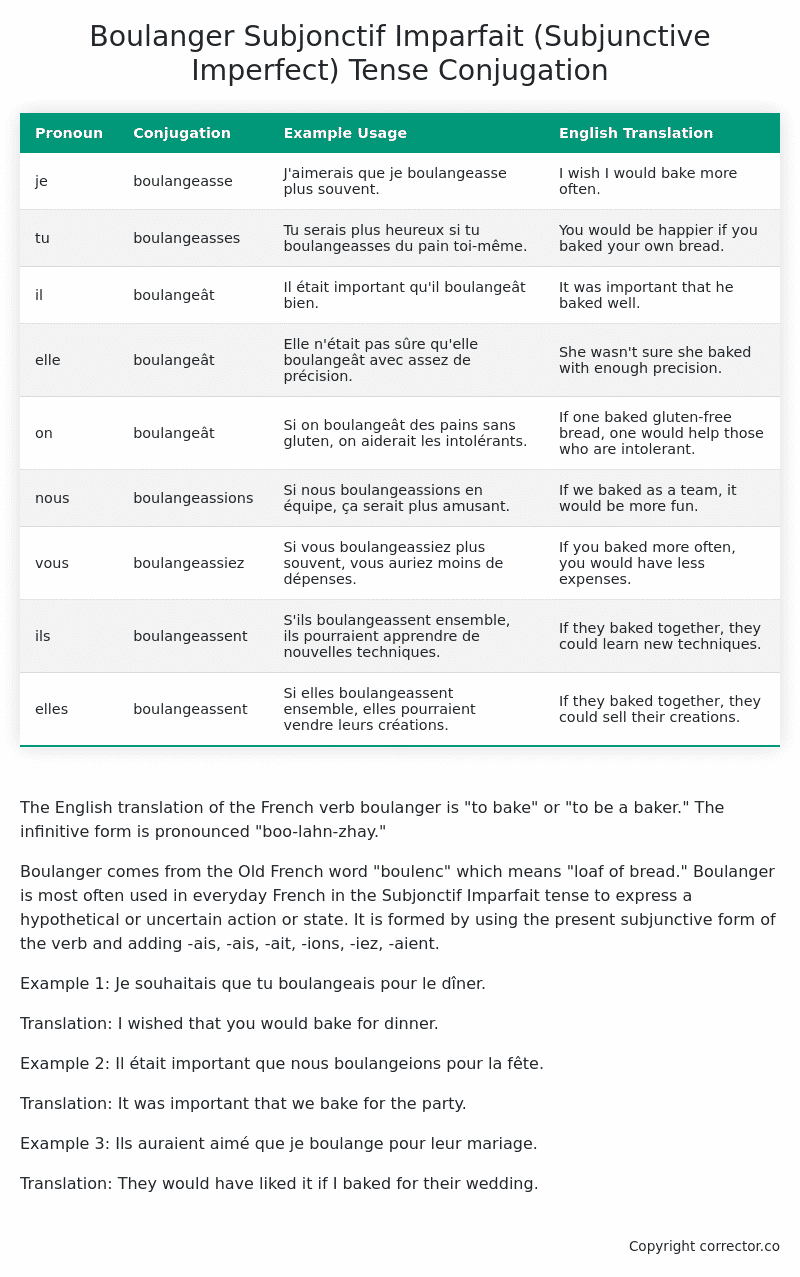Subjonctif Imparfait (Subjunctive Imperfect) Tense Conjugation of the French Verb boulanger
Introduction to the verb boulanger
The English translation of the French verb boulanger is “to bake” or “to be a baker.” The infinitive form is pronounced “boo-lahn-zhay.”
Boulanger comes from the Old French word “boulenc” which means “loaf of bread.” Boulanger is most often used in everyday French in the Subjonctif Imparfait tense to express a hypothetical or uncertain action or state. It is formed by using the present subjunctive form of the verb and adding -ais, -ais, -ait, -ions, -iez, -aient.
Example 1: Je souhaitais que tu boulangeais pour le dîner.
Translation: I wished that you would bake for dinner.
Example 2: Il était important que nous boulangeions pour la fête.
Translation: It was important that we bake for the party.
Example 3: Ils auraient aimé que je boulange pour leur mariage.
Translation: They would have liked it if I baked for their wedding.
Table of the Subjonctif Imparfait (Subjunctive Imperfect) Tense Conjugation of boulanger
| Pronoun | Conjugation | Example Usage | English Translation |
|---|---|---|---|
| je | boulangeasse | J’aimerais que je boulangeasse plus souvent. | I wish I would bake more often. |
| tu | boulangeasses | Tu serais plus heureux si tu boulangeasses du pain toi-même. | You would be happier if you baked your own bread. |
| il | boulangeât | Il était important qu’il boulangeât bien. | It was important that he baked well. |
| elle | boulangeât | Elle n’était pas sûre qu’elle boulangeât avec assez de précision. | She wasn’t sure she baked with enough precision. |
| on | boulangeât | Si on boulangeât des pains sans gluten, on aiderait les intolérants. | If one baked gluten-free bread, one would help those who are intolerant. |
| nous | boulangeassions | Si nous boulangeassions en équipe, ça serait plus amusant. | If we baked as a team, it would be more fun. |
| vous | boulangeassiez | Si vous boulangeassiez plus souvent, vous auriez moins de dépenses. | If you baked more often, you would have less expenses. |
| ils | boulangeassent | S’ils boulangeassent ensemble, ils pourraient apprendre de nouvelles techniques. | If they baked together, they could learn new techniques. |
| elles | boulangeassent | Si elles boulangeassent ensemble, elles pourraient vendre leurs créations. | If they baked together, they could sell their creations. |
Other Conjugations for Boulanger.
Le Present (Present Tense) Conjugation of the French Verb boulanger
Imparfait (Imperfect) Tense Conjugation of the French Verb boulanger
Passé Simple (Simple Past) Tense Conjugation of the French Verb boulanger
Passé Composé (Present Perfect) Tense Conjugation of the French Verb boulanger
Futur Simple (Simple Future) Tense Conjugation of the French Verb boulanger
Futur Proche (Near Future) Tense Conjugation of the French Verb boulanger
Plus-que-parfait (Pluperfect) Tense Conjugation of the French Verb boulanger
Passé Antérieur (Past Anterior) Tense Conjugation of the French Verb boulanger
Futur Antérieur (Future Anterior) Tense Conjugation of the French Verb boulanger
Subjonctif Présent (Subjunctive Present) Tense Conjugation of the French Verb boulanger
Subjonctif Passé (Subjunctive Past) Tense Conjugation of the French Verb boulanger
Subjonctif Imparfait (Subjunctive Imperfect) Tense Conjugation of the French Verb boulanger (this article)
Subjonctif Plus-que-parfait (Subjunctive Pluperfect) Tense Conjugation of the French Verb boulanger
Conditionnel Présent (Conditional Present) Tense Conjugation of the French Verb boulanger
Conditionnel Passé (Conditional Past) Tense Conjugation of the French Verb boulanger
L’impératif Présent (Imperative Present) Tense Conjugation of the French Verb boulanger
L’infinitif Présent (Infinitive Present) Tense Conjugation of the French Verb boulanger
Struggling with French verbs or the language in general? Why not use our free French Grammar Checker – no registration required!
Get a FREE Download Study Sheet of this Conjugation 🔥
Simply right click the image below, click “save image” and get your free reference for the boulanger Subjonctif Imparfait tense conjugation!

Boulanger – About the French Subjonctif Imparfait (Subjunctive Imperfect) Tense
Formation
Common Everyday Usage Patterns
Interactions with Other Tenses
Subjonctif Présent
Indicatif Passé Composé
Conditional
Conditional Perfect
Summary
I hope you enjoyed this article on the verb boulanger. Still in a learning mood? Check out another TOTALLY random French verb conjugation!


